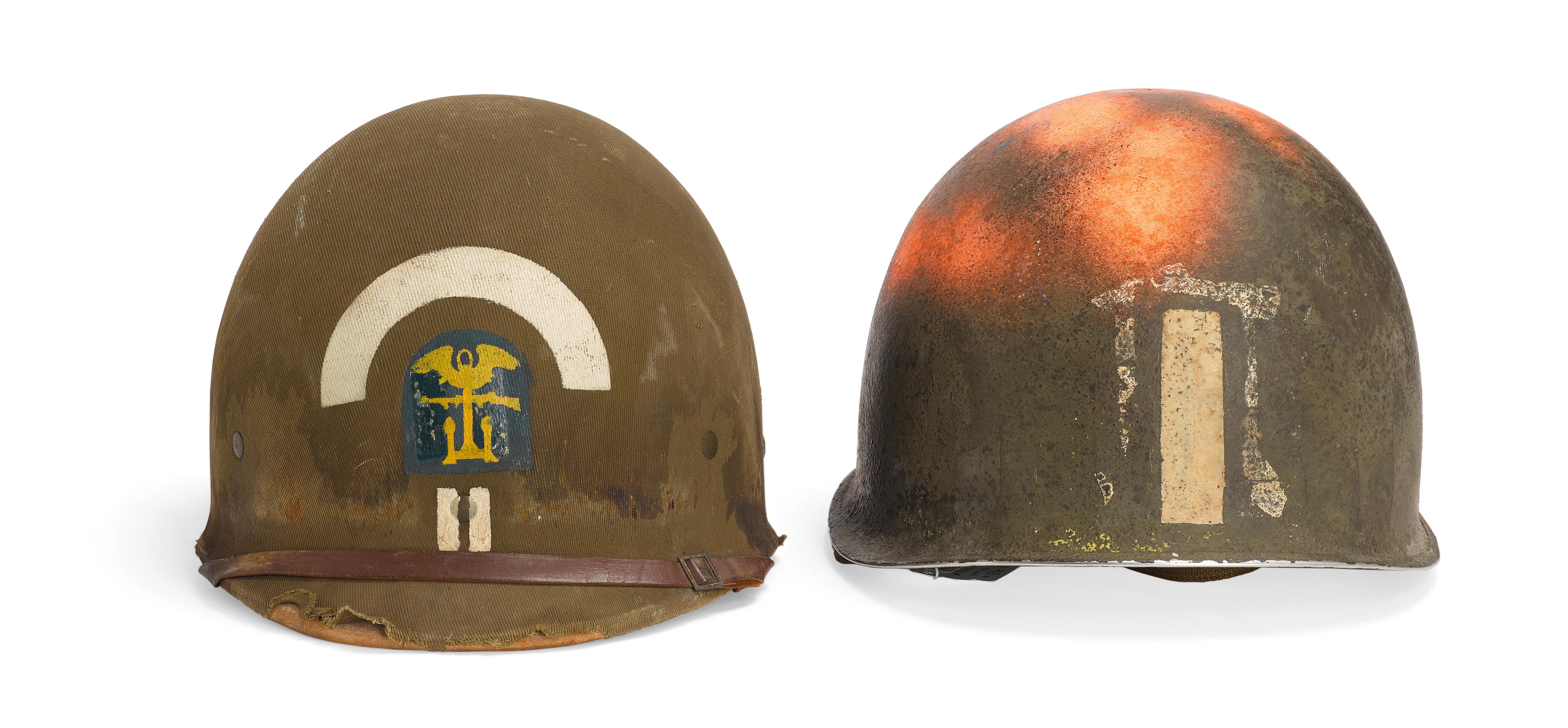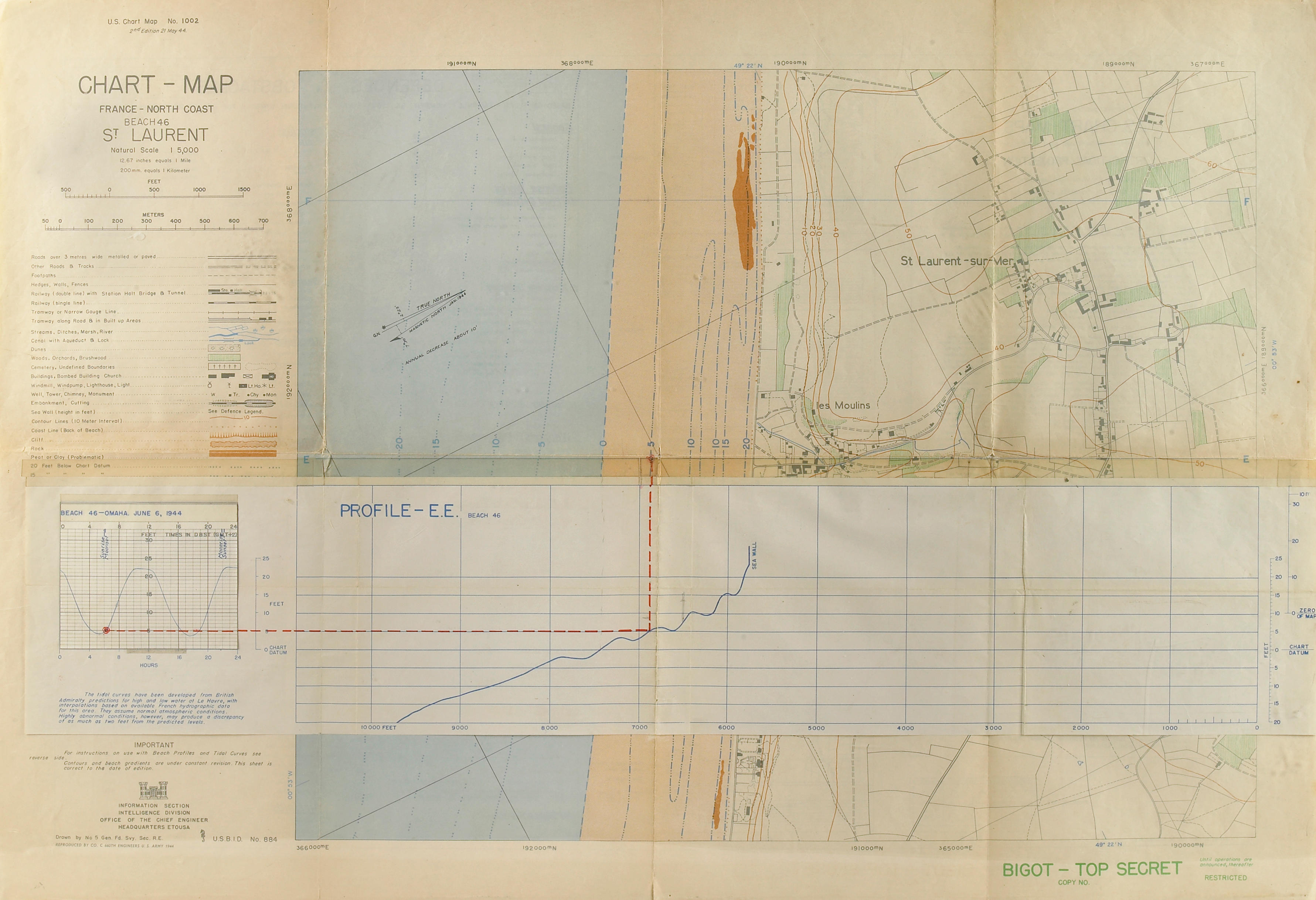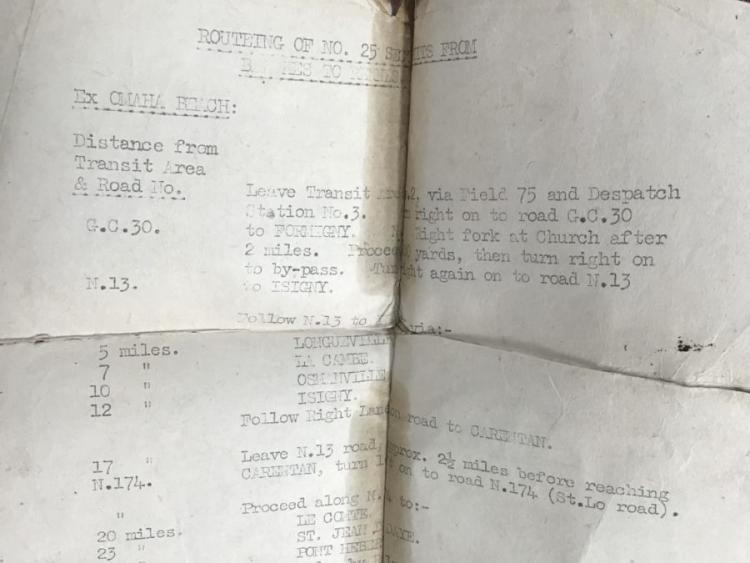Omaha Beach - West (Vierville-sur-Mer). Second Beach Obstacle Overprint - Information as of 30 May. At bottom "Top Secret - bigot Until Departure for Combat Operations - then this sheet becomes Restricted." Framed, double-glazed so both sides are visible. 24.25 x 19.5 in. (sight). Top 2/3 or so is a plan view of the western part of the beach, just about 6000 yards of it. The later information notes additional beach and land obstacles, such as fishnets, hedgehogs, tetrahedrons, anti-tank ditches, and mine fields. Just above the "Second Overprint..." note is a line with "Dog Red ----- Dog White ------Dog Green --------Charlie------Charlie" across the map. Along the shore, especially just above the "dog" notations are many obstacles in the water and steep cliffs just onshore. Extensive legends mark tidal or mud flats, marsh land, trees, orchards, hedges, dunes, gravel, cliffs, slopes, rocky cliffs, etc. The western half of the map is primarily tidal flats, which would be nonexistent during some part of landing operations. There are also sandbars which are noted as being above water at low tide in the landing zone. Below the plan view is a panoramic photographic view - as the pilots of the landing craft would see it, with landmarks noted. However, in the legend of the map is a note to Coxswains or Navigators: "Building landmarks, especially near the beach, may be destroys any craft land. Terrain features, therefore, are much more reliable for visual navigation from panoramic shoreline sketch above.... Also on reverse side are Sunlight and Moonlight Table, data on Inshore Currents and Tidal Stages." _________________________________________________________________ Planning for the invasion of Europe began in 1943 at the Trident Conference in Washington in May of that year. A draft of the plan was accepted at Quebec in August, with Dwight Eisenhower as commander of the Allied Expeditionary Force and Bernard Montgomery as commander of the land forces. The coastline was divided into five landing beaches - Utah, Omaha, Gold, Juno and Sword. Utah was on the Cotentin Peninsula, which juts north into the English Channel, so its orientation is almost North-South. Where the peninsula meets the Normandy coast, the other beaches run primarily East-West. American forces were responsible for Utah and Omaha Beaches and British forces for Gold and Sword Beaches, with Canadian forces at Juno. Mixed in were Free French, Polish and other contingents (Belgium, Czechoslovakia, Greece, Netherlands, Australia, New Zealand, Norway, etc.) A swampy area separated the two areas, essentially cutting off the Utah Beach forces. Omaha's high rocky cliffs resulted in the heaviest casualties for those forces. The forces for the five beaches finally met about a week later. It would still take a month for Allied forces to gain firm control of Normandy. Condition: A few areas of light foxing. Not removed from frame for examination.
Omaha Beach - West (Vierville-sur-Mer). Second Beach Obstacle Overprint - Information as of 30 May. At bottom "Top Secret - bigot Until Departure for Combat Operations - then this sheet becomes Restricted." Framed, double-glazed so both sides are visible. 24.25 x 19.5 in. (sight). Top 2/3 or so is a plan view of the western part of the beach, just about 6000 yards of it. The later information notes additional beach and land obstacles, such as fishnets, hedgehogs, tetrahedrons, anti-tank ditches, and mine fields. Just above the "Second Overprint..." note is a line with "Dog Red ----- Dog White ------Dog Green --------Charlie------Charlie" across the map. Along the shore, especially just above the "dog" notations are many obstacles in the water and steep cliffs just onshore. Extensive legends mark tidal or mud flats, marsh land, trees, orchards, hedges, dunes, gravel, cliffs, slopes, rocky cliffs, etc. The western half of the map is primarily tidal flats, which would be nonexistent during some part of landing operations. There are also sandbars which are noted as being above water at low tide in the landing zone. Below the plan view is a panoramic photographic view - as the pilots of the landing craft would see it, with landmarks noted. However, in the legend of the map is a note to Coxswains or Navigators: "Building landmarks, especially near the beach, may be destroys any craft land. Terrain features, therefore, are much more reliable for visual navigation from panoramic shoreline sketch above.... Also on reverse side are Sunlight and Moonlight Table, data on Inshore Currents and Tidal Stages." _________________________________________________________________ Planning for the invasion of Europe began in 1943 at the Trident Conference in Washington in May of that year. A draft of the plan was accepted at Quebec in August, with Dwight Eisenhower as commander of the Allied Expeditionary Force and Bernard Montgomery as commander of the land forces. The coastline was divided into five landing beaches - Utah, Omaha, Gold, Juno and Sword. Utah was on the Cotentin Peninsula, which juts north into the English Channel, so its orientation is almost North-South. Where the peninsula meets the Normandy coast, the other beaches run primarily East-West. American forces were responsible for Utah and Omaha Beaches and British forces for Gold and Sword Beaches, with Canadian forces at Juno. Mixed in were Free French, Polish and other contingents (Belgium, Czechoslovakia, Greece, Netherlands, Australia, New Zealand, Norway, etc.) A swampy area separated the two areas, essentially cutting off the Utah Beach forces. Omaha's high rocky cliffs resulted in the heaviest casualties for those forces. The forces for the five beaches finally met about a week later. It would still take a month for Allied forces to gain firm control of Normandy. Condition: A few areas of light foxing. Not removed from frame for examination.













Try LotSearch and its premium features for 7 days - without any costs!
Be notified automatically about new items in upcoming auctions.
Create an alert